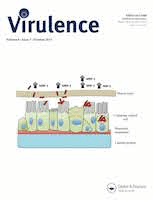
Virulence
Scope & Guideline
Advancing the Frontiers of Pathogen Research
Introduction
Aims and Scopes
- Pathogen-Host Interactions:
The journal emphasizes the study of how pathogens interact with host cells, including mechanisms of invasion, immune evasion, and modulation of host responses. - Molecular Mechanisms of Virulence:
Research published in 'Virulence' often delves into the specific molecular pathways and factors that contribute to the pathogenicity of various microbes, including bacteria, viruses, fungi, and parasites. - Antimicrobial Resistance:
A significant focus is placed on understanding the mechanisms behind antimicrobial resistance, including genetic adaptations of pathogens and the implications for treatment strategies. - Vaccine Development and Immunology:
The journal also covers advancements in vaccine development, particularly those targeting virulence factors, and explores the immunological responses elicited by various pathogens. - Emerging Infectious Diseases:
'Virulence' frequently highlights research on emerging pathogens and infectious diseases, addressing global health concerns and the need for novel therapeutic approaches.
Trending and Emerging
- Multi-Omics Approaches:
There is a rising trend in utilizing multi-omics approaches (genomics, transcriptomics, proteomics) to understand the multifaceted nature of virulence and pathogen-host interactions comprehensively. - Host Immune Response Dynamics:
Research focusing on the intricacies of host immune responses to various pathogens is increasingly prevalent, highlighting the need to understand how pathogens evade or manipulate these responses. - Virulence Factor Targeted Therapies:
Emerging studies are increasingly centered on the development of therapies targeting specific virulence factors, with an aim to disarm pathogens rather than outright kill them, thereby reducing resistance. - Impact of the Microbiome on Pathogenicity:
The role of the microbiome in influencing pathogen virulence and disease outcomes is gaining attention, emphasizing the complex interactions within host ecosystems. - Environmental and Ecological Influences on Pathogenesis:
Research exploring how environmental factors and ecological contexts affect pathogen behavior and virulence is on the rise, reflecting a more holistic view of infectious disease dynamics.
Declining or Waning
- Traditional Pathogen Characterization:
Research dedicated solely to basic pathogen characterization without linking to virulence or host interaction has decreased, as the field moves towards more integrated studies. - Single-Pathogen Studies:
There is a noticeable decline in studies focusing exclusively on single pathogens; instead, there is a growing trend towards exploring polymicrobial infections and interactions among multiple pathogens. - Historical Perspectives on Infectious Diseases:
Papers that provide a historical analysis of pathogen virulence factors or outbreaks are becoming less common, as contemporary research emphasizes current challenges and novel findings. - Basic Genomic Studies:
Research that primarily focuses on the genomic sequencing of pathogens without functional analysis related to virulence is waning, as functional genomics and systems biology approaches gain prominence.
Similar Journals

Infectious Diseases
Advancing the Frontiers of Infectious Disease ResearchInfectious Diseases, published by TAYLOR & FRANCIS LTD, is a leading academic journal dedicated to advancing research in the field of infectious diseases and microbiology. With an impressive impact factor and categorized in Q1 in multiple areas including Immunology and Microbiology, this journal serves as a critical platform for researchers, practitioners, and students to disseminate their findings and stay abreast of current advancements. The journal is recognized for its rigorous peer-review process and aims to foster innovation and collaboration across disciplines from 2015 to 2024. It boasts a robust Scopus ranking, positioning it favorably among the top-tier of journals in the relevant fields, making it an essential resource for anyone involved in infectious disease research. Access options are available, ensuring that the latest research is accessible to a global audience, thus emphasizing the journal's commitment to promoting knowledge and understanding in the ever-evolving landscape of infectious diseases.

Gut Pathogens
Fostering Innovation in Gut Pathogen ResearchGut Pathogens, published by BMC in the United Kingdom, is a premier open-access journal focusing on the intersection of gut health and infectious diseases. With its impact firmly established since its inception in 2009, the journal has earned impressive rankings, including Q1 in renowned categories such as Gastroenterology, Infectious Diseases, Microbiology, and Parasitology, while maintaining a strong presence in Virology. The journal serves as a vital resource for researchers, professionals, and students interested in the intricate relationships between gut microbiota and pathogenic organisms, offering insights that drive advancements in treatment and prevention strategies. By providing unrestricted access to high-quality research, Gut Pathogens fosters a collaborative environment, encouraging the dissemination of knowledge and innovation within the field. The journal publishes original research, reviews, and case studies, all designed to address contemporary challenges in gut health, ultimately aiming to improve patient outcomes and public health worldwide.
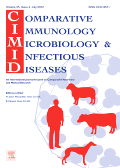
COMPARATIVE IMMUNOLOGY MICROBIOLOGY AND INFECTIOUS DISEASES
Fostering Collaborative Insights in Veterinary SciencesComparative Immunology Microbiology and Infectious Diseases, published by Elsevier Science Ltd, is a prominent journal dedicated to advancing the fields of immunology, microbiology, infectious diseases, and veterinary sciences. Established in 1978, this journal has become a vital resource for researchers and professionals alike, with a commendable impact factor that reflects its significance in academia. The journal, available in both print and electronic formats (ISSN: 0147-9571, E-ISSN: 1878-1667), stands out for its commitment to disseminating innovative research findings, particularly through its categorization in Q2 and Q3 quartiles across various related disciplines as of 2023. The journal aims to provide insightful comparative analyses that enhance our understanding of host-pathogen interactions, immune responses, and disease manifestations. With a global readership base, it serves as a platform for collaborative discourse among scientists and professionals, ultimately contributing to the improvement of health outcomes worldwide.

Emerging Microbes & Infections
Connecting researchers to combat emerging microbes.Emerging Microbes & Infections is a premier open access journal, published by Taylor & Francis Ltd since 2012, dedicated to advancing the understanding of microbial infections and their implications in human health. With an impressive Q1 ranking across multiple categories—including Drug Discovery, Epidemiology, Immunology, and Infectious Diseases—this journal is at the forefront of research in the microbiological sciences. Covering a diverse range of topics, it serves as a vital resource for researchers, healthcare professionals, and students alike. The journal's commitment to open access ensures worldwide dissemination of cutting-edge findings, fostering collaboration and innovation in tackling challenges posed by emerging infections. As part of the thriving academic community in the United Kingdom, Emerging Microbes & Infections plays a crucial role in shaping the future of infectious disease research and public health.
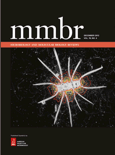
MICROBIOLOGY AND MOLECULAR BIOLOGY REVIEWS
Exploring the Intricacies of Life at the Microbial LevelMICROBIOLOGY AND MOLECULAR BIOLOGY REVIEWS, published by the American Society for Microbiology, is a premier journal dedicated to advancing the fields of microbiology and molecular biology. With an impressive impact factor reflective of its Q1 ranking in categories such as Immunology, Infectious Diseases, and Molecular Biology, this journal consistently showcases high-quality, peer-reviewed articles that contribute to the current understanding of microbial life and molecular mechanisms. Operating since 1997, the journal aims to bridge the gap between microbiological methods and molecular biology applications, making it an essential resource for researchers, professionals, and students alike. Readers can access content through various platforms, ensuring that the latest findings are readily available to the scientific community. With its esteemed reputation, MICROBIOLOGY AND MOLECULAR BIOLOGY REVIEWS remains a leading voice in the exploration of the life sciences, catering to a broad audience deeply invested in unraveling the complexities of microbial and molecular systems.
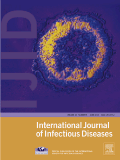
INTERNATIONAL JOURNAL OF INFECTIOUS DISEASES
Advancing global insights in infectious diseases.INTERNATIONAL JOURNAL OF INFECTIOUS DISEASES, published by ELSEVIER SCI LTD, stands as a leading platform in the realm of infectious diseases, contributing significantly to the global understanding of this critical field. With an impressive impact factor, the journal maintains a distinguished Q1 ranking across various categories, including Infectious Diseases, Medicine (miscellaneous), and Medical Microbiology, demonstrating its high relevance and influence among contemporary research. Since its inception in 1996, it has embraced an Open Access model, allowing for wider dissemination of essential research findings that can inform public health policies and clinical practices. With a commitment to advancing scientific knowledge, this journal is not only a vital resource for researchers and professionals but also serves as an invaluable educational tool for students interested in the complexities of infectious diseases and their management. For those looking to stay at the forefront of research and innovation in this field, the INTERNATIONAL JOURNAL OF INFECTIOUS DISEASES is an indispensable resource.

Archives of Clinical Infectious Diseases
Pioneering Research for Public Health ImpactArchives of Clinical Infectious Diseases is a peer-reviewed journal dedicated to advancing knowledge in the field of infectious diseases, published by BRIEFLAND in Iran. With a broad scope, it covers various aspects of cardiology, critical care, immunology, microbiology, public health, and toxicology, affirming its relevance in today's health landscape. Despite the lack of open access options, the journal maintains a strong reputation, reflected in its Q3 ranking in multiple categories within the 2023 category quartiles. The journal aims to provide a platform for researchers and practitioners to disseminate critical findings that can impact clinical practices and public health policies. Its commitment to rigorous peer review ensures that only high-quality research is published, thereby serving as an essential resource for professionals, students, and public health advocates. For those engaged in the ever-evolving world of infectious diseases, Archives of Clinical Infectious Diseases stands as a vital contribution to the medical literature.
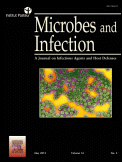
MICROBES AND INFECTION
Innovating Solutions for Infectious Disease ChallengesMICROBES AND INFECTION is a premier academic journal published by Elsevier, dedicated to the dynamic fields of immunology, infectious diseases, and microbiology. With a notable impact factor reflective of its high-quality research contributions, the journal is categorized in the Q2 quartile across these fields as of 2023. Based in France and operating since 1999, MICROBES AND INFECTION offers a platform for researchers, professionals, and students to disseminate and access cutting-edge findings that drive innovation and knowledge in microbial and infectious disease research. The journal is ranked impressively within the Scopus database, securing ranks such as #16 in Microbiology and #33 in Infectious Diseases, underscoring its high relevance in the scientific community. Subscribers to the journal can expect an array of articles, reviews, and original research, all designed to advance understanding and improve clinical practices in the fight against infectious agents. With its ongoing commitment to open access options, MICROBES AND INFECTION continues to foster global collaboration and information sharing in the pursuit of addressing pressing microbiological challenges.
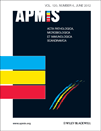
APMIS
Pioneering Research for the Future of Medical ScienceAPMIS is a distinguished academic journal published by WILEY that serves as a vital resource for researchers and practitioners in the fields of Immunology, Allergy, Microbiology, and Pathology. Established in 1988 and continuing its mission through 2024, this journal facilitates the dissemination of high-quality research findings, contributing to the intersection of multiple disciplines within the medical sciences. With an ISSN of 0903-4641 and an E-ISSN of 1600-0463, APMIS is categorized in 2023's Q2 and Q3 quartiles across various domains, reflecting its significant impact, with rankings such as #50/208 in Pathology and Forensic Medicine and #121/233 in Immunology and Allergy. Although it currently does not offer open access options, the journal’s rigorous peer-review process ensures that published articles maintain the highest standards of scholarship. With its focus on innovative research, APMIS continues to occupy a pivotal role for those seeking to advance their expertise and contribute to scientific dialogue in these essential fields.
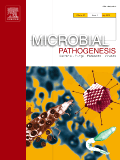
MICROBIAL PATHOGENESIS
Driving Insights into Microbial Disease DynamicsMICROBIAL PATHOGENESIS, published by Academic Press Ltd - Elsevier Science Ltd, is a prominent journal in the fields of Infectious Diseases and Microbiology, with a notable impact factor and classified in the Q2 quartile for both categories as of 2023. Since its inception in 1986, this journal has provided a platform for the dissemination of cutting-edge research that enhances our understanding of microbial infections and their implications in health and disease. The journal is indexed in Scopus, ranking #80 among 344 in Infectious Diseases and #57 among 182 in Microbiology, underscoring its significant contribution to the scientific community. Although it operates under a traditional subscription model, the content is vital for researchers, professionals, and students focused on the dynamics of microbial pathogenesis and the development of innovative therapeutic strategies. The journal's comprehensive scope aims to foster advancements in this critical area of study, bridging the gap between laboratory research and clinical applications.